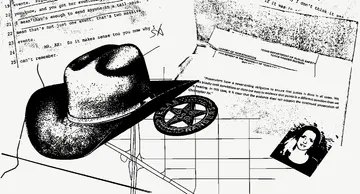This is The Marshall Project’s Closing Argument newsletter, a weekly deep dive into a key criminal justice issue. Want this delivered to your inbox? Subscribe to future newsletters here.
Late last week, Texas officials abruptly blocked off access to a public park in the border town of Eagle Pass. Shelby Park, which sits along the Rio Grande, had become a popular site for migrants attempting to cross into the U.S. Against the city’s wishes, the move has effectively banished federal Border Patrol agents, who had been using the park as a staging area for receiving asylum seekers before transporting them for further processing.
The remarkable scene — essentially an armed standoff between the state’s National Guard and federal agents — is just one episode in what has been an escalating battle between Texas Gov. Greg Abbott and the Biden administration over border security. Abbott has also clashed with the administration over his effort to block parts of the Rio Grande with buoys and razor wire, and over a Texas law enacted last month that makes it a state crime to cross into the U.S. illegally.
Numerous observers have noted that these efforts likely violate federal law, the Constitution, and Supreme Court precedent, all of which broadly delegate immigration enforcement powers to the federal government. Abbott responded earlier this month that the federal government’s inability or unwillingness to enforce federal immigration law “creates the opening” for Texas to do so on its own. The region has seen record numbers of border crossings in recent months, primarily by people from Mexico, Venezuela, and Guatemala.
On Wednesday, the 5th Circuit Court of Appeals granted Texas a new hearing over its efforts to physically block the river, meaning that the buoys and concertina wire can stay up for now. Litigation on Abbott's other efforts to tighten the border between Texas and Mexico is also pending.
According to the Department of Homeland Security, Texas has denied Border Patrol access in situations where federal agents tried to offer emergency assistance to migrants in distress. The department cited the cases of three people, including two children, who drowned in the Rio Grande on Jan. 12. Later legal filings revealed that the deaths occurred before border patrol had requested access to the area — but that two other migrants experiencing hypothermia had to be aided by Mexican authorities, since Border Patrol couldn’t gain access to the river. While Border Patrol does routinely mount emergency response efforts, it’s worth noting that the agency also has a long history of abuse, misconduct, and unaccountable violence.
Ultimately, all these matters are likely headed for the U.S. Supreme Court. Writing for Slate, Mark Joseph Stern argues that while the case “should be one of the easiest that the Supreme Court has ever confronted,” the court’s delay in responding to the Department of Justice’s requests might signal that justices are indeed open to Texas’ approach.
One of Abbott’s other immigration gambits, bussing migrants to northern cities, also continues to play out legally, albeit in lower-stakes cases. The Texas-based bus company Wynne Transportation, which has received more than $75 million from the state to transport migrants north over the last year, is suing the city of Chicago over new restrictions that made it illegal for buses to drop off passengers without approval. Ironically, Wynne is arguing that the city ordinances interfere with interstate commerce, which like border security, is constitutionally reserved for regulation by the federal government.
In New York, Mayor Eric Adams filed a lawsuit against Wynne and the 16 other bus companies that have transported more than 33,000 migrants to the city from the border since August of 2022. (Many more have arrived by means not paid for by Texas.) Adams filed the suit based on an obscure misdemeanor in the state code designed to punish anyone who brings “a needy person from out of the state into this state for the purpose of making him a public charge.” The lawsuit is doomed to fail, writes Errol Louis in New York Magazine, because laws of this nature were struck down as unconstitutional by the Supreme Court in 1941.
Hundreds of thousands of migrants have already arrived in major cities like New York, Chicago, Denver and Boston, and most locations have struggled to shelter the new arrivals. In New York earlier this month, the city began evicting some migrant families who’ve spent more than 60 days in city homeless shelters, directing them to a re-ticketing process to secure another place to stay.
Migrants in these cold-weather cities have also had to navigate precarious access to shelter during a blast of winter storms and brutal cold. Many lack both proper winter clothes and any previous experience with cold weather.
In Chicago, officials have resorted to sheltering people in library basements, parked city buses, police stations, and airports. In Denver, advocates are teaching residents of tent encampments cold-weather survival skills.
